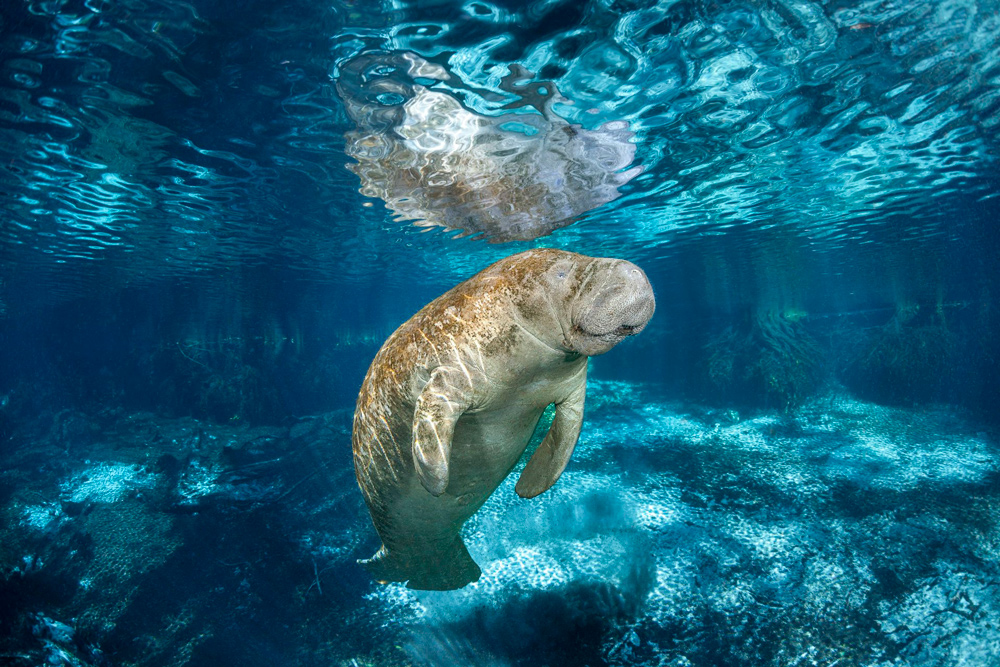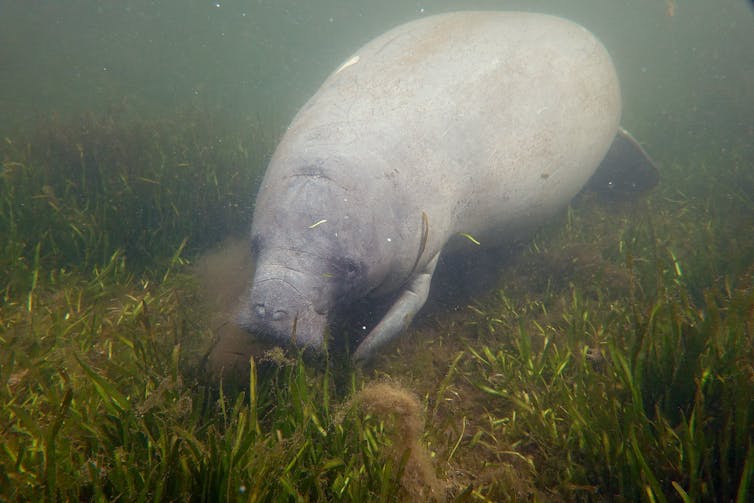
By Aarin-Conrad Allen
The gentle, slow-moving Florida manatee has no natural predators.
And yet, these charismatic mammals face numerous threats.
Manatees are struck by vessels in busy waterways across the state, and a majority bear scars from these collisions.
Harmful algal blooms – characterized by the rapid growth of algae that degrades water quality – can impair their nervous systems.
With less blubber, or fat, compared with other marine mammals like whales, dolphins, seals and sea lions, manatees are vulnerable to cold-stress syndrome during winter months.
And they can ingest or get entangled in marine debris like derelict fishing gear and drown or be crushed by floodgate and water control structures.
I am a doctoral candidate in marine biology at Florida International University’s Institute of Environment. Over the past 15 years, I have gained extensive experience working with marine mammals, particularly manatees.
Recently, my colleagues at the United States Geological Survey, Florida Department of Environmental Protection and I documented a change in the dietary pattern of manatees. We found that manatees are eating less seagrass – traditionally their primary food source – and more algae than in decades past. This change occurred along Florida’s Atlantic coast during a period of extensive seagrass decline.
We believe this represents an emerging threat to the species’ survival.
Protected species
Manatees were listed as an endangered species under the Endangered Species Act of 1973. By the early 1990s, the manatee population in Florida had dwindled to less than 1,300.
Researchers believe that federal protection, along with additional state measures such as slow-speed zones and no-entry refuges, has contributed to the growth of the manatee population in Florida.
In 2017, manatees were reclassified from endangered to threatened. Surveyors counted 5,733 individual manatees during a statewide aerial survey conducted in 2019.
Florida manatees average 9-12 feet (2.7-3.7 meters) in length and typically weigh about 1,000 pounds (450 kilograms), but they can grow as large as 3,500 pounds (1,600 kilograms). As the largest fully aquatic herbivore, they consume 5% to 10% of their body weight in vegetation each day.
While manatees eat a broad diet of over 60 different plants, they most commonly feed on species of seagrass. Seagrasses are marine plants that, like land plants, have leaves, flowers, roots and seeds, and make their food through photosynthesis.
So what happens when these seagrasses are no longer available?
A changing estuary
The Indian River Lagoon is an estuary along Florida’s east coast that covers roughly 350 square miles (560 square kilometers) between the mainland and barrier islands, from Ponce Inlet to Jupiter Inlet.
It is a critical habitat for manatees, which feed on native seagrass meadows in the lagoon during their seasonal migrations.
Seagrasses are vital to the health of marine ecosystems. They are a habitat for juvenile fish and other marine organisms, provide food for aquatic herbivores, reduce carbon in the atmosphere and improve water quality. They also protect coastal habitats by stabilizing sediments and reducing wave energy that can erode shorelines and damage coastal infrastructure, especially during hurricanes.
For more than a decade, the Indian River Lagoon has experienced extensive loss of seagrass meadows, due to a series of algae blooms associated with nutrient runoff and degraded water quality from septic overflow leaching into the environment.
When untreated sewage and fertilizers flow into the estuary, they add nitrogen, phosphorus and other nutrients that drive excessive algal growth. These harmful algal blooms deplete oxygen levels and block sunlight, which seagrass needs for photosynthesis.
Between 2011 and 2019, over 50% of all seagrass in the lagoon was lost. This led to an increase in macroalgae and even led to a change in the animal communities that live in the lagoon. For example, among finfish, sheepshead populations declined, while seabream numbers increased. Invertebrate communities were also affected, with bryozoans colonizing areas previously dominated by barnacles.
Manatees along the Atlantic coast have suffered two unusual mortality events since the seagrass decline, including one that is ongoing. Researchers attribute the increase in manatee deaths to malnutrition due to a shortage of seagrasses in the Indian River Lagoon.

Joe Raedle/Getty Images
A shift in manatees’ diet
In our study, we examined 193 manatee stomach samples collected from carcasses recovered from the Indian River Lagoon during two time periods – one before and one after the onset of the seagrass loss in 2011.
We compared stomach sample contents from carcasses collected between 1977 and 1989 with samples collected between 2013 and 2015.
Our findings indicate that manatees consumed 45% less seagrass and 74% more algae after the seagrass decline.
Recently, in a study supported by FIU’s Center for Aquatic Chemistry and Environment, I investigated differences in the nutritional composition – like protein, fat, carbohydrate and fiber – of items identified in manatee stomach samples. My preliminary results show notable differences in the nutritional composition of seagrass and algae.
Marine mammals are particularly vulnerable to dietary shifts due to their large size and high energy demands. Such changes can worsen their physical health and increase the likelihood of starvation.
Depleted oxygen levels are having a similar impact on aquatic vegetation and seagrass meadows in other regions of Florida, like Biscayne Bay and the Caloosahatchee River and Estuary. This suggests that the ecological challenges seen in the Indian River Lagoon could become more widespread.
What is the solution?
Remediation efforts within the lagoon have incorporated the restoration of seagrass through aquaculture and replanting strategies, similar to efforts to restore coral reefs.
While the lagoon’s seagrass has recently shown signs of regrowth, the rehabilitation of the ecosystem must begin with improving and maintaining water quality.
Counties along the lagoon have enacted fertilizer bans that aim to reduce the levels of nitrogen and phosphorus in the water that drive algal blooms.
New research, however, indicates that these restrictions alone will not fix the problem, as residential septic systems are the primary source of nutrient pollution in the lagoon.
Furthermore, many of the factors contributing to harmful algal blooms are intensified by global warming and changing climate, which could accelerate the decline of seagrass in Florida and elsewhere.
Given the multiple, synergistic threats facing manatees, I believe that improving water quality, protecting their food sources, and further research – coupled with community outreach and education – are critical to ensure the long-term survival of this iconic Florida species.
![]()
Aarin-Conrad Allen is a doctoral candidate in Marine Sciences at Florida International University.





























JimboXYZ says
Grow, grow, grow, the Visions of 2050 in action. Open borders, 8 billion plus and continuing. Redistributing that population daily with migrations globally.
Deport elon says
Ha nearly 70 percent of all living animals have disappeared over the past 50 years. We are in the 6th mass extinction. Manatees are done we not going to stop polluting. Profits over all! Now our chief convict a climate denier wants to end the epa. Yeah you don’t need breathable air or drinkable water that’s communist. You must pay extra to get those. Will be great if your a billionaire everyone else you are screwed, enjoy the collapse.
Alex says
What is the State of Florida doing about this, NOTHING they don’t seem to care about wild life or stop polluting the waters.
Remember DeSantis continues to deny climate change when Florida is getting hit with more hurricanes and tornadoes then ever before. Another reason why insurance companies are abandoning the state.
Adam Halkias says
Manatees aren’t food…